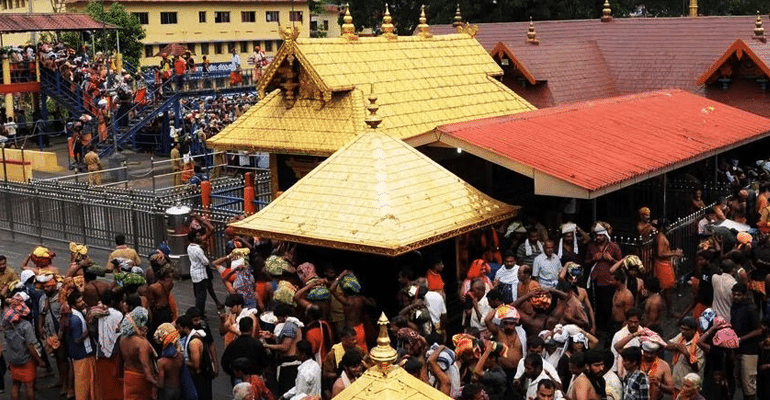On Friday, September 28, the Supreme Court of India has lifted the ban on women entering Kerala’s Sabarimala temple. This puts an end to the age-old restriction that women aged between 10 and 50 are barred from entering the temple premises, on the grounds of “impurity”. Now like men, women will also have the constitutional right to enter and pray in the temple.
Headed by Chief Justice Dipak Misra, the five-judge constitution bench gave a 4:1 verdict. Hailing the verdict of the Supreme Court, the counsel for the Kerala Government said that they too support the cause of women.

The issue came under the spotlight when last year on October 13, the apex court had referred this issue to a Constitution bench after asking 5 important questions including whether the practice of barring women from entering the temple amounted to discrimination and violated their fundamental rights under the Constitution.
According to the PTI report, the bench comprising of justices R F Nariman, A M Khanwilkar, D Y Chandrachud, and Indu Malhotra observed “When a man can enter, a woman can also go. What applies to a man, applies to a woman also.”
Referring to the Article 25 and 26 of the Constitution, the bench said that “the right to enter a temple is not dependent on a legislation. It is the constitutional right.”
Further, the senior advocate Indira Jaising assailed the practice and said that banning women from entering the temple premises of certain age groups was violative of various fundamental rights including Article 17 that deals with untouchability. Also, by referring to the definition of term Hindu under various statutes, she said that the women were discriminated against not on the ground of sex but because of menstruation.
Speaking on the ban on entry of women inside the temple, CJI Dipak Misra said, “Women no way inferior to men. On one hand, women are worshipped as Goddesses, but there are restrictions on the other hand. Relationship with God can’t be defined by biological or physiological factors.”
Adding to this he said, devotion cannot be subjected to discrimination. “Patriarchal rules have to change. Patriarchy in religion cannot be allowed to trump right to pray and practice religion.”
Voicing her disagreement, Justice Indu Malhotra said that it is not for the court to interfere in the religious matters. “Equality doctrine cannot override fundamental right to worship under Article 25” and added that Lord Ayyappa devotees form a separate religious denomination worthy of protection.
Under the veil of religion, a woman cannot be denied the rights of worship. Justice Chandrachud said, “Religion cannot be used as cover to deny rights of worship to women and it is also against human dignity. Prohibition on women is due to non-religious reasons and it is a grim shadow of discrimination going on for centuries.”
While announcing the verdict CJI Mishra added that “Banning entry of women to shrine is gender discrimination and devotion cannot be subjected to discrimination.” Further, adding to this he said that “Devotees of Lord Ayyappa do not constitute separate denomination and patriarchal notion won’t be allowed to outride the equality in devotion.”
Here is how Twitteratis are celebrating the verdict.
1. Founder of Happy To Bleed, Nikita Anand wrote:
Three years, endless fights and struggles, from Happy to Bleed to filing the intervention in Supreme Court – here we are! Menstruation destigmatized by India’s apex court. pic.twitter.com/nPA7v70Bt1
— Nikita Azad (@Nikita_azad) September 28, 2018
2. Director of CSR, Ranjana Kumari wrote:
— Ranjana Kumari (@ranjanakumari) September 28, 2018
3. Advocate, SC of India, Karuna Nundy wrote:
So glad to see that the doctrine of fundamental rights creating a minimum standard in religious practise is gaining traction in the jurisprudence. #Sabarimala. Not glad at all for the dissenting judge to be targetted as a ‘woman judge’.
— Karuna Nundy (@karunanundy) September 28, 2018
4. Journalist Barkha Dutt wrote:
My minor crush on the Supreme Court could become major at this rate 🙂 Thank you . Menstruating Women can no longer be barred from #Sabarimala – Bleeding is not a blot. #StopSexism #Period. #SabarimalaVerdict p.s curious dissent by lone female judge on bench https://t.co/GAj2jA6e0T
— barkha dutt (@BDUTT) September 28, 2018

